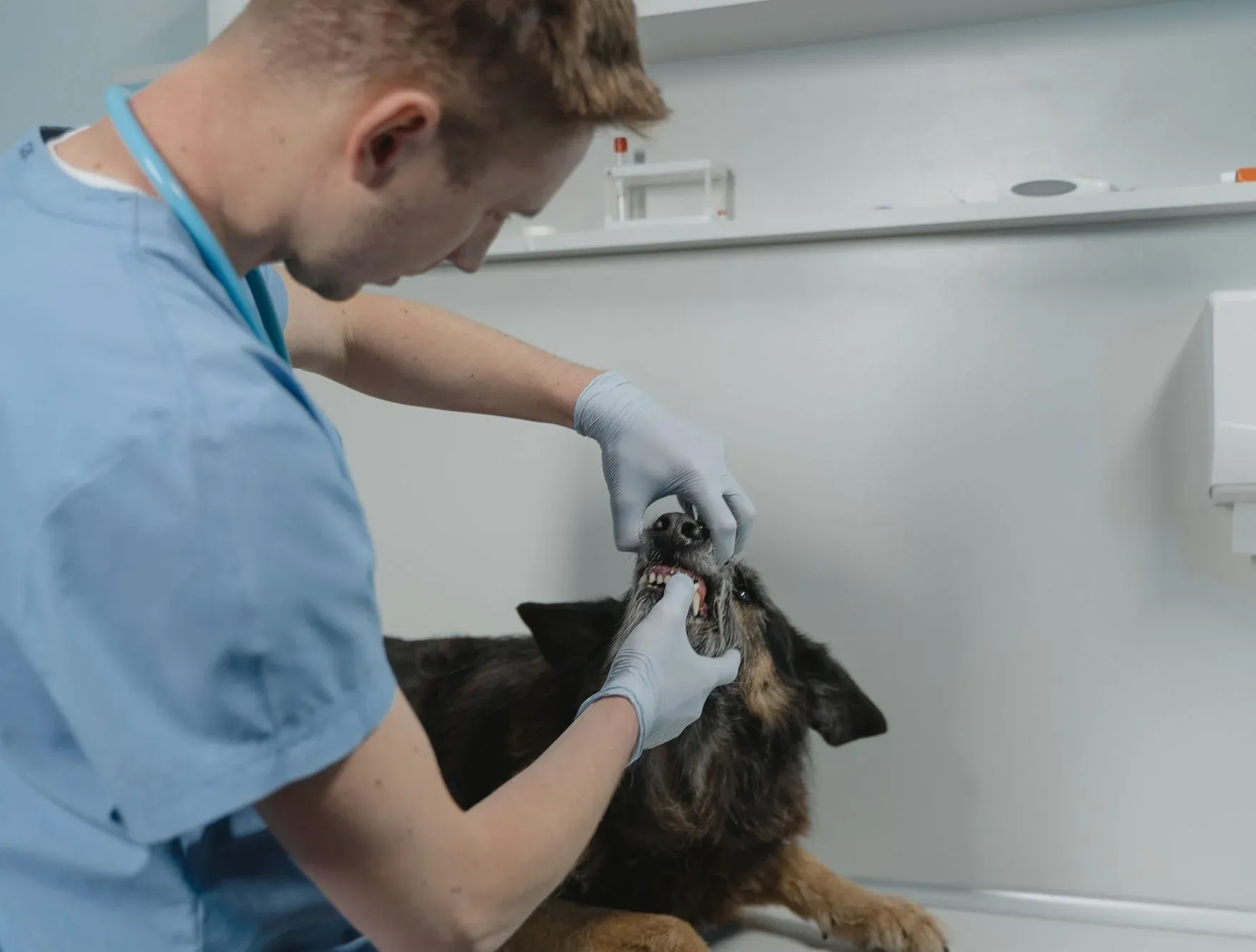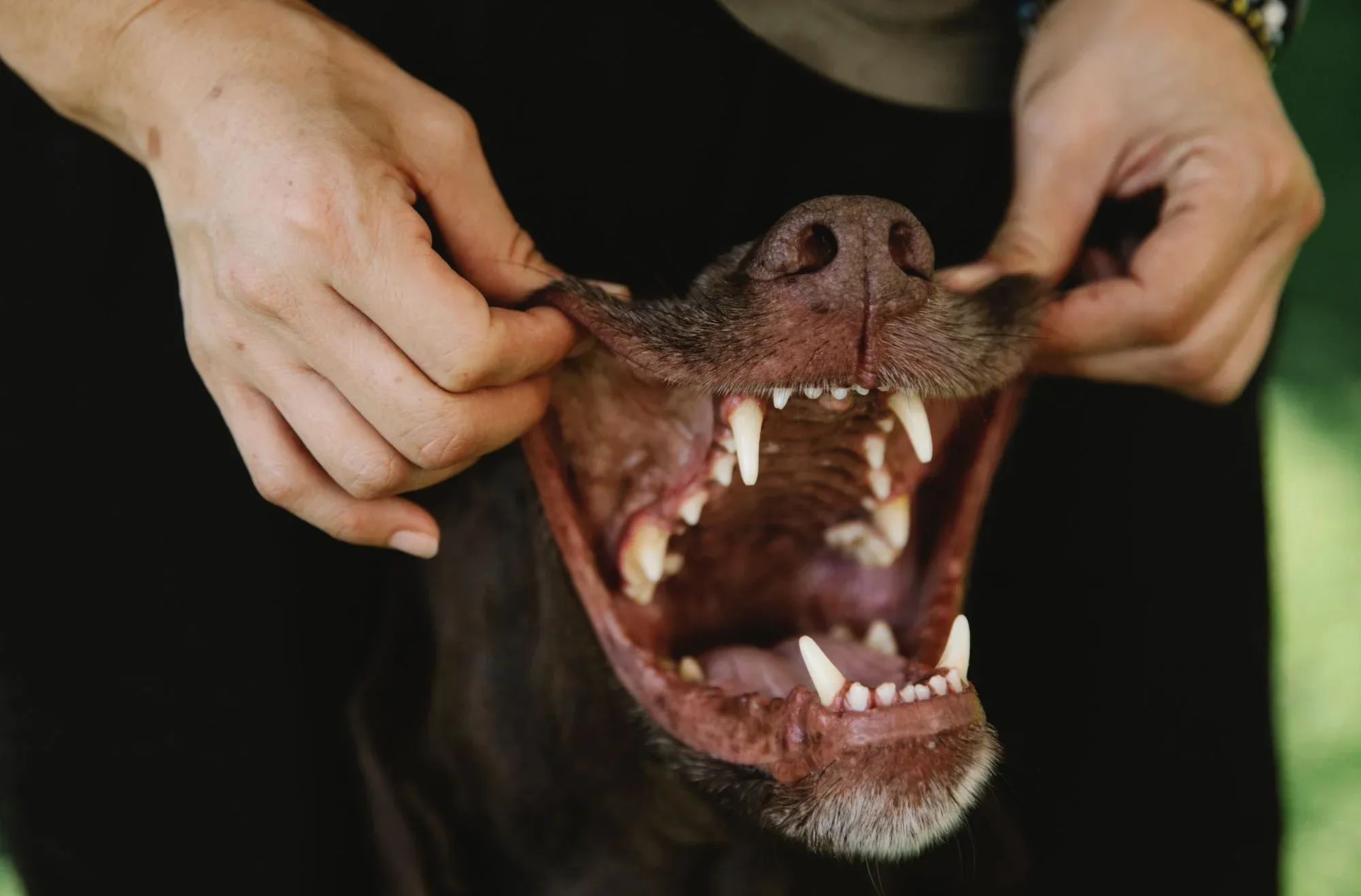Dog tooth decay home remedy: Understand the causes, symptoms, and importance of treating dog tooth decay. Explore home remedies and dental care strategies for your dog's oral health.
Dog tooth decay is a common dental issue that can cause pain, discomfort, and even serious health complications in dogs if left untreated. Understanding the causes, symptoms, and importance of treating dog tooth decay is essential for maintaining your furry friend's oral health. While veterinary care is crucial in severe cases, there are several home remedies that can help prevent and manage dog tooth decay.
Incorporating regular brushing, dental chews and toys, coconut oil pulling, apple cider vinegar rinse, and turmeric paste into your dog's oral care routine can promote healthier teeth and gums. Dietary considerations and professional dental cleanings play a significant role in preventing and treating dog tooth decay. By implementing these tips and strategies, you can ensure your dog enjoys good oral health and a comfortable life.

Key takeaways:
- Regular brushing is crucial: Brushing your dog's teeth regularly helps prevent tooth decay by removing plaque and tartar buildup.
- Dental chews and toys aid in oral health: Giving your dog dental chews and toys can help clean their teeth and reduce the risk of tooth decay.
- Coconut oil pulling has benefits: Swishing coconut oil in your dog's mouth can help reduce bacteria and inflammation, promoting healthier teeth and gums.
Understanding Dog Tooth Decay
Understanding dog tooth decay is essential for pet owners to prevent and manage this common dental problem in dogs. It can cause pain, infections, and eventually tooth loss. Dog tooth decay occurs when there is a buildup of plaque and tartar on the teeth, creating an ideal environment for bacteria to thrive. Factors such as poor dental hygiene, diet, genetics, and age can all contribute to the development of tooth decay in dogs. To prevent and treat dog tooth decay, it is important to provide regular dental care, including brushing their teeth, offering dental chews or treats, and scheduling routine vet check-ups.
What Causes Dog Tooth Decay?
Dog tooth decay is primarily caused by poor dental hygiene and a buildup of plaque and tartar on the teeth. These factors lead to the growth of harmful bacteria that attack the tooth enamel, resulting in cavities and decay. In addition to this, a high-sugar diet, lack of proper dental care, and certain medical conditions can contribute to dog tooth decay. To prevent this, regular brushing, dental chews, and professional dental cleanings are crucial. It is also important to provide a balanced diet and avoid feeding sugary treats. Regular veterinary check-ups are essential for early detection and treatment of tooth decay.
Symptoms of Dog Tooth Decay
Symptoms of Dog Tooth Decay can appear in various ways and should never be ignored. It is crucial to watch out for indications like foul breath, teeth discolored in yellow or brown, gums that are inflamed or bleeding, excessive drooling, and difficulties while eating. Additionally, your furry companion might exhibit signs of pain or discomfort when their oral cavity is touched. By regularly examining your dog's teeth and gums and promptly addressing any dental issues, you can prevent further damage and ensure their overall dental health.
The Importance of Treating Dog Tooth Decay
The Importance of Treating Dog Tooth Decay cannot be stressed enough. It is crucial to prioritize the treatment of dog tooth decay to ensure the overall health and well-being of your furry friend. Ignoring this issue can lead to various complications and discomfort for your pet. Treating dog tooth decay not only helps prevent pain, infection, and potential tooth loss but also ensures that your dog's ability to eat is not affected, thus avoiding nutritional deficiencies. To address dog tooth decay, it is highly recommended to consult a veterinarian for proper diagnosis and treatment options. Additionally, incorporating regular dental hygiene practices, such as brushing your dog's teeth and providing dental treats, can also play a significant role in maintaining oral health. Always keep in mind that early intervention is the key to preserving your dog's dental health.
When to Seek Veterinary Care
It is important to know when to seek veterinary care for your dog's tooth decay. When there are signs of severe pain, bleeding, swelling, or difficulty eating, it is crucial to seek professional veterinary care immediately. If your dog's tooth decay is accompanied by other health issues or if their overall behavior or appetite changes, it is recommended to consult a veterinarian for proper diagnosis and treatment. Remember, timely veterinary care is essential for your dog's oral health.

Home Remedies for Dog Tooth Decay
Discover effective home remedies to combat dog tooth decay and ensure your furry friend's dental health. From regular brushing and dental chews to coconut oil pulling and apple cider vinegar rinses, we'll explore a range of natural solutions that can promote oral hygiene for your canine companion. We'll unravel the benefits of incorporating turmeric paste into your dog's dental care routine. Say goodbye to costly vet bills and embrace these simple yet powerful remedies to keep your dog's teeth healthy and strong. Explore these dog tooth decay home remedies today.0110100101010010101001010
1. Regular Brushing
Regular brushing is crucial for maintaining your dog's oral hygiene and preventing tooth decay. Here are some steps to follow for regular brushing:
- Choose a toothbrush specifically designed for dogs, with soft bristles.
- Use toothpaste formulated for dogs, as human toothpaste can be toxic to them.
- Start slowly and gradually introduce your dog to the brushing routine.
- Gently brush your dog's teeth using circular motions, focusing on all surfaces.
- Pay special attention to the back teeth, where plaque buildup is common.
- Be patient and reward your dog with treats and praise to make brushing a positive experience.
- Brush your dog's teeth regularly, at least 2-3 times a week, for optimal oral health.
Remember, regular brushing is just one part of a comprehensive dental care routine for your furry friend. Regular veterinary check-ups, professional dental cleanings, and a balanced diet also play a vital role in preventing dog tooth decay. Keep your furry friend's smile healthy and bright by practicing regular brushing and providing proper dental care.
2. Dental Chews and Toys
Dental chews and toys are vital for maintaining a dog's dental health. They play a crucial role in removing plaque and tartar buildup by encouraging chewing and providing a gentle abrasive action on the teeth. Here are some options for dental chews and toys for dogs:
- Dental sticks: These sticks are specially designed to cleanse the teeth and gums when chewed.
- Rubber toys: Certain toys, such as Kong toys, can be filled with dental treats or toothpaste to effectively clean the teeth while the dog plays.
- Rawhide chews: These chews can keep the dog entertained while also assisting in the removal of plaque and tartar buildup.
- Dental ropes: These ropes can be used for interactive play and also contribute to teeth cleaning.
When my friend's dog experienced severe plaque buildup, they incorporated dental chews and toys into their dental care routine. Over time, they observed a significant improvement in their dog's dental health. The veterinarian also confirmed that the dental chews and toys had a positive impact on their dog's oral hygiene during a routine check-up. Therefore, incorporating dental chews and toys can be an effective way to maintain your dog's teeth' cleanliness and overall health.

3. Coconut Oil Pulling
Coconut oil pulling, also known as the process of using coconut oil as a natural remedy, is an effective technique to combat dog tooth decay and promote better oral health for your furry friend. To incorporate this beneficial practice into your dog's routine, follow these simple steps:
- Commence the process by taking a small amount of coconut oil.
- Gently and carefully apply the oil to your dog's teeth and gums, ensuring thorough coverage.
- Allow your dog to joyfully lick and swish the oil around their mouth for a few minutes, as this encourages maximum effectiveness.
- Once the oil-pulling session is complete, rinse your dog's mouth with water to eliminate any residual oil.
Let me share a heartwarming anecdote: One of my acquaintances had a dog grappling with severe tooth decay. In search of a natural and holistic approach, they decided to try coconut oil pulling as a home remedy. To their delight, they observed a remarkable enhancement in their dog's oral health. Regular utilization of coconut oil pulling not only diminished the accumulation of plaque but also bestowed their dog with revitalizing breath.
Coconut oil pulling, which involves utilizing coconut oil to combat dog tooth decay, is a natural and effective method for improving your dog's oral health. The following steps outline how to perform coconut oil pulling for your furry companion:
- Begin by using a small amount of coconut oil.
- Gently apply the oil to your dog's teeth and gums.
- Allow your dog to naturally lick and swish the oil around their mouth for a few minutes.
- Afterward, rinse your dog's mouth with water to eliminate any remaining oil.
I have a true story to share: A friend of mine faced the challenge of their dog suffering from severe tooth decay. They decided to explore coconut oil pulling as a natural solution and noticed a significant improvement in their dog's oral health. Consistently practicing coconut oil pulling helped reduce plaque build-up and freshen their dog's breath.
4. Apple Cider Vinegar Rinse
Apple cider vinegar rinse, also known as the Apple Cider Vinegar Rinse, is a natural and affordable remedy for dog tooth decay that can be easily incorporated into your pet's dental care routine. Here are the steps to follow:
- Prepare a solution by mixing equal parts of water and apple cider vinegar.
- Using a clean cloth or a small toothbrush, gently rub the Apple Cider Vinegar Rinse onto your dog's teeth and gums.
- Pay extra attention to areas with visible tartar buildup or signs of decay.
- Allow your dog to naturally swallow or spit out the Apple Cider Vinegar Rinse; there is no need to rinse it off.
Pro-tip: It is important to consult with your veterinarian before starting any home remedies, such as the Apple Cider Vinegar Rinse, to ensure they are appropriate for your dog's specific dental condition.
5. Turmeric Paste
To create a turmeric paste for dog tooth decay, follow these steps:
- Mix 1 tablespoon of turmeric powder with 1/2 tablespoon of coconut oil in a small bowl.
- Add a few drops of water to the turmeric paste mixture to achieve a paste-like consistency.
- Gently apply the turmeric paste to your dog's teeth using a toothbrush or your finger.
- Allow the turmeric paste to sit on your dog's teeth for 2-3 minutes.
- Rinse your dog's mouth thoroughly with water to remove any residue.
Turmeric paste has anti-inflammatory and antibacterial properties that can help reduce inflammation and fight bacteria in the mouth. It's important to note that turmeric paste can stain your dog's teeth and may not be suitable for all dogs. It's always best to consult with your veterinarian before trying any home remedies for dog tooth decay.

Dietary Considerations for Dog Tooth Decay
When it comes to dietary considerations for dog tooth decay, there are a few key factors to keep in mind:
- Limit Sugary and Sticky Foods: These can contribute to the buildup of plaque and lead to tooth decay.
- Incorporate Dental-Friendly Foods: Offer your dog crunchy and chewy foods like carrots and dental treats, which can help remove plaque and tartar.
- Provide a Balanced Diet: Ensure your dog's diet includes all the necessary nutrients for optimal oral health.
- Schedule Regular Vet Check-Ups: Your veterinarian can provide guidance on specific dietary recommendations to support your dog's oral health.
Professional Dental Cleaning for Dogs
<li>Schedule an appointment for a professional dental cleaning for dogs with a <strong>veterinarian specializing in dental care</strong>.</li>
<li>During the initial consultation, the veterinarian will examine your dog's teeth and gums to assess the level of cleaning required.</li>
<li>If necessary, <strong>anesthesia</strong> might be administered to ensure a stress-free and thorough cleaning process.</li>
<li>The veterinarian will use specialized tools to remove tartar and <strong>plaque buildup</strong> from your dog's teeth.</li>
<li>After the cleaning, the veterinarian may polish the teeth to further protect against future <strong>plaque formation</strong>.</li>
<li>A follow-up visit may be recommended to monitor your dog's dental health and provide further treatment if necessary.</li>
</ul>
<p><em>True story:</em> One dog owner, concerned about their furry friend's dental health, sought a professional dental cleaning for dogs. The veterinarian's expertise and thorough cleaning not only improved the dog's oral health but also prevented potential complications down the line. Now, the dog enjoys a healthier mouth and a happier, pain-free life.</p>
<h2>Tips for Preventing Dog Tooth Decay</h2>
<p>
Preventing tooth decay in dogs is extremely important for maintaining their dental health. Here are some valuable tips to prevent <em>dog</em> tooth decay:
</p>
<ol>
<li>Regular brushing: It is essential to brush your <em>dog</em>'s teeth using a toothbrush and toothpaste specifically formulated for <em>dogs</em>.</li>
<li>Dental chew toys: Give your <em>dog</em> dental chew toys to facilitate the removal of plaque and tartar buildup.</li>
<li>Diet and nutrition: Provide your <em>dog</em> with a well-balanced diet that includes dental-friendly foods, such as crunchy kibble or <em>dental</em> treats.</li>
<li>Regular vet visits: Schedule regular dental check-ups with your veterinarian to identify and address any potential dental issues at an early stage.</li>
<li>Water additives: Consider using water additives that can reduce plaque and freshen your <em>dog</em>'s breath.</li>
</ol>
<p>
By following these tips to prevent <em>dog</em> tooth decay, you can ensure that your beloved pet's dental health remains in optimal condition.
</p><p><div></div><div class="facts" style="background: #F6F1F1; margin: 0 auto; display: table; padding: 30px; margin-top: 50px; margin-bottom: 50px; border-radius: 4px; max-width: 720px;">
<h2>Some Facts About Dog Tooth Decay Home Remedy:</h2>
<div class="facts_body" style="display: flex; font-size: 16px;">
<ul>
<li><strong>✅ Many pet owners neglect to take care of their dog's oral health, which can lead to gum disease and tooth decay.</strong></li>
<li><strong>✅ Dogs should have their teeth brushed daily and chew toys can also help promote good oral health by reducing plaque.</strong></li>
<li><strong>✅ Tooth decay in dogs is less common than in humans, with periodontal disease and fractured teeth being the most common dental issues.</strong></li>
<li><strong>✅ Plaque, calculus or tartar, gingivitis, and periodontitis are all terms related to dental health in dogs.</strong></li>
<li><strong>✅ Bacteria can grow in a dog's mouth after interacting with food, chew toys, or any object that goes into their mouth.</strong></li>
</ul>
</div>
</div><h2>Frequently Asked Questions</h2><h3>What are some home remedies for dog tooth decay?</h3>
There are several home remedies that can help with dog tooth decay. Regularly brushing your dog's teeth using a dog toothbrush and toothpaste specifically designed for dogs is one of the most effective remedies. Providing your dog with chew toys can also help reduce plaque buildup. Additionally, incorporating raw meaty bones and chewy muscle meat into their diet can promote better oral health.
<h3>What are the causes of tooth and gum disease in dogs?</h3>
The causes of tooth and gum disease in dogs can be attributed to factors such as neglected dental hygiene, lack of dental care, and poor oral health. Other causes include changes in their body due to aging, genetic predisposition, and diets comprising mainly of hard kibble. Additionally, neglected dental hygiene and poor oral health can lead to tartar, plaque, and infections in dogs.
<h3>How can I treat gingivitis in my dog at home?</h3>
While it is recommended to consult a veterinarian for proper treatment, there are some natural ways to treat gingivitis in dogs at home. You can try rinsing the affected area with a salt water solution every 2-3 hours, which can help reduce inflammation. Applying coconut oil to the infected area may also provide antibacterial properties and help reduce swelling. However, it is important to note that veterinary care is necessary for a complete and effective treatment.
<h3>What are the signs of tooth infection in dogs?</h3>
Dogs often hide their pain, making it challenging to notice signs of a tooth infection. However, some subtle signs include avoiding hard food, not chewing toys, bad breath, and excessive drooling. Swelling of the face is a more advanced sign of infection and requires immediate veterinary attention.
<h3>Should I consider dental surgery for my dog's tooth infection?</h3>
The appropriate treatment for a tooth infection depends on the severity and assessment by a veterinarian. While pulling the infected tooth is often the cheapest and easiest option, a root canal may be recommended to save the tooth if it can be performed. Ultimately, the veterinarian will provide guidance on the best course of action for your dog's specific situation.
<h3>How can I prevent tooth decay and gum disease in my dog?</h3>
To prevent tooth decay and gum disease in dogs, it is essential to prioritize their dental care. Here are some tips: (1) Brush your dog's teeth daily using a dog toothbrush and toothpaste. (2) Provide chew toys that can help reduce plaque buildup. (3) Incorporate raw meaty bones and chewy muscle meat into their diet to promote good oral health. (4) Schedule regular checks with a veterinarian for dental and gum disease evaluations. (5) Educate yourself about proper dental hygiene for pets to minimize the prevalence of dental problems.
